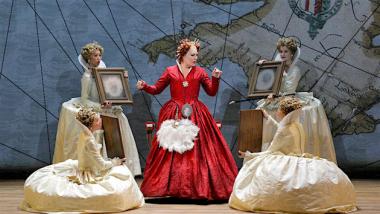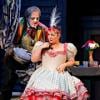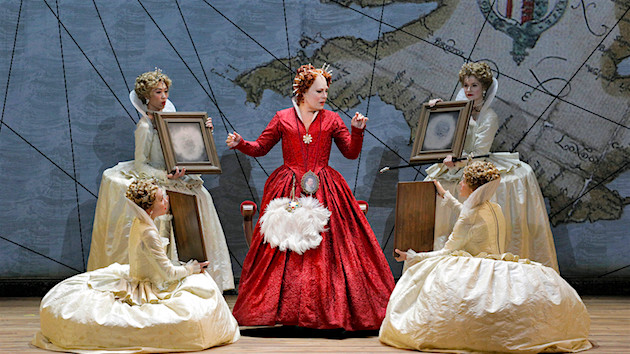
Even if you’re hot stuff, it doesn’t pay to offend the queen.
That’s the moral of Donizetti’s Roberto Devereux, in which the title hero loses his head for loving a woman other than the aging, but passionate Queen Elizabeth I. San Francisco Opera’s production has stars that make this simple love triangle a searing musical drama and a staging that questions the whole genre of history plays (and operas).
A whirlwind overture pantomime recounts Elizabeth I’s traumatic life history, with a special guest appearance by Shakespeare. It feels insulting to the audience’s intelligence: buffs of opera or history already know these facts. But the purpose of the pantomime isn’t didactic; it is to introduce Elizabeth as a sort of storybook heroine. (Her climactic moment at the end of the overture, which I won’t spoil by describing here, is truly heroic.)
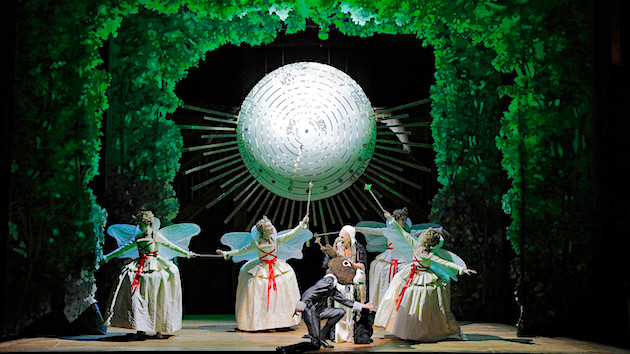
Director Stephen Lawless uses his production to examine the narrative afterlives of real people. Benoît Dugardyn’s set is modeled on the Globe Theatre, emphasizing that what we’re seeing is a fiction. Characters from Elizabeth’s past make appearances as nineteenth-century diorama models encased in glass. At the end of the opera, Elizabeth steps into her own glass case. Lawless’s concept is coherent and adds a thought-provoking layer to a flimsily plotted opera. Some details – synchronized sewing by the women’s chorus, Lord Cecil’s comically exaggerated use of violence, Nottingham’s appearance with blood-soaked hands – prove unfortunately distracting.
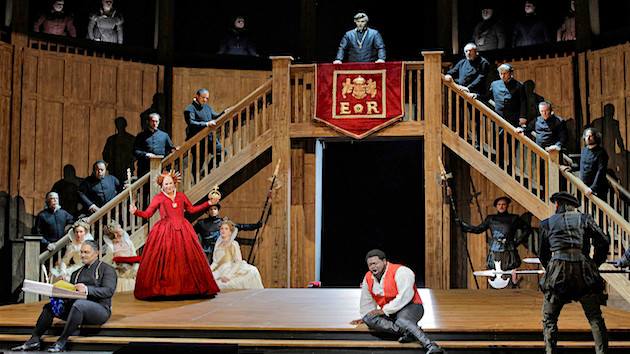
Not than anything could distract from Queen Sondra Radvanovsky when she is on the stage. Her Elisabetta is a force of nature. She shows the signs of age clearly in her tottering steps and a hairline that has receded out of sight, but she refuses to succumb. She proudly rejects helping hands and preens in her mirror. Her belief in her own strength and beauty lends credibility to her deluded passion for Roberto Devereux. Radvanovsky’s sound is steely and cutting, without a glimmer of warmth, and so powerful it verges on pushed. Yet her muscular approach never interferes with clean coloratura – in fact, it lends her runs and ornaments extra dramatic impetus. Her phrasing also astonishes: She takes her voice from shriek to whisper and back in a single line of text.
As Elisabetta’s friend and innocent rival Sara, Jamie Barton deploys a richly layered, tightly controlled voice that she makes delicate or harsh to suit the drama. In a den of nasty personalities, Barton’s Sara is touchingly sincere. Russell Thomas’s Roberto Devereux inspires less sympathy. He’s a smirking, conceiting poppycock, speaking noble-sounding words while flaunting the ring he knows will save him. He is at his most sympathetic in the third act, when he realizes he may not escape his fate. There, Thomas’s hefty, mobile voice gains a buttery softness and breaks off achingly at the end of phrases.
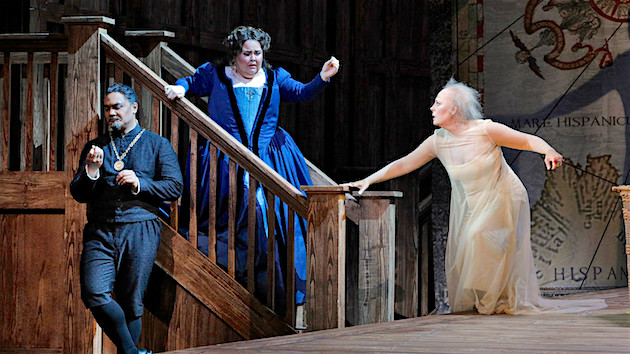
The other three men of the opera are sketched as moustache-twirling villains. Nottingham, initially Devereux’s devoted friend, turns brutal, strangling and raping Sara during their confrontation. This is especially jarring because Andrew Manea looks so mild-mannered in his plain clothes and spectacles. He sings Nottingham in a flowing line with nice roundness of tone. He is not quite at home in the role yet: stiffness and lack of expressive variety marred his first scene. Other Adler Fellows made excellent smaller contributions: Amitai Pati’s sunny sound as Lord Cecil contrasted with his character’s gleeful evil, and Christian Pursell gave Sir Walter Raleigh a full, honeyed voice and delightful swagger.
Riccardo Frizza led the San Francisco Opera Orchestra with a light touch. There were shakes and crashes where the score called for them, but the overall impression was of stately dignity. Donizetti’s score often lets the singers drive the musical drama, and Frizza followed their lead. The San Francisco Opera Chorus’s sound was lovely but not coordinated: individual voices stood out at the starts and ends of phrases (possibly the fault of their unusual physical arrangement on the stage).
As distorted as history looks through the lens of a Donizetti opera, it sounds fabulous. Let’s hope more (and similarly well-cast) Tudor queens operas await San Francisco audiences in future seasons.

